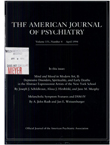Are there clinical differences between familial and nonfamilial Alzheimer's disease?
Abstract
OBJECTIVE: The purpose of the study was to determine whether there are differences in clinical characteristics in two groups of patients with Alzheimer's disease, those reported to have a family history of dementia and those without a family history of dementia. METHOD: Using a data set from an Alzheimer's disease patient registry, funded as part of a National Institute on Aging cooperative agreement, the authors made comparisons of sociodemographic and clinical variables in a group of 462 patients with Alzheimer's disease, 172 reported to have at least one first-degree relative with dementia and 290 classified with no family history. RESULTS: Patients with a presumptive family history differed from those without a family history in two ways: the course of dementia was described as having a fast rather than a slow progression from onset of symptoms to diagnosis, and caregivers reported a higher prevalence of family history of psychiatric disorders. There were no significant differences in age at onset, duration, female gender, aphasia and apraxia, handedness, family history of Down's syndrome, or number of children, brothers, and sisters. CONCLUSIONS: The association of faster course and family history of psychiatric disorders in the patients with a family history of dementia is consistent with the hypothesis of heterogeneity, but the overall results could also be explained by a genetic-environmental model of Alzheimer's disease.
Access content
To read the fulltext, please use one of the options below to sign in or purchase access.- Personal login
- Institutional Login
- Sign in via OpenAthens
- Register for access
-
Please login/register if you wish to pair your device and check access availability.
Not a subscriber?
PsychiatryOnline subscription options offer access to the DSM-5 library, books, journals, CME, and patient resources. This all-in-one virtual library provides psychiatrists and mental health professionals with key resources for diagnosis, treatment, research, and professional development.
Need more help? PsychiatryOnline Customer Service may be reached by emailing [email protected] or by calling 800-368-5777 (in the U.S.) or 703-907-7322 (outside the U.S.).



